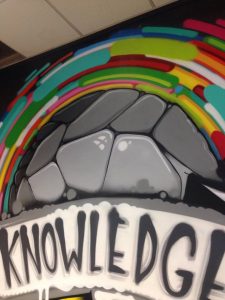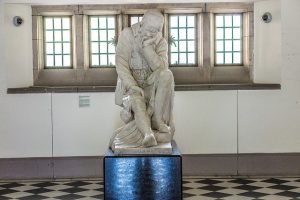The commercial mind-set of the twenty-first century in general does not place much value on arts degrees beyond that of them being a freeloader route into tertiary education under a guise of ‘wishy-washy’ self-expression. There is a defensiveness that must come with being an arts/humanities student; an automatic write-off of intelligence when equated with those studying engineering or medicine. It is true perhaps that in plain terms, our 8 hours a week are incomparable to the 30-hour week of those dwelling in the MBC, but, to be frank; there is a bravery in studying a ‘non-vocational’ degree. In choosing a subject you are passionate about when all the propaganda of the day was ushering you towards the STEM buildings, ‘taking a road less travelled’ and refusing to following a direct path takes gumption.
The arts have a mass appeal to laymen; whilst not everyone is a fan of metaphysical poetry, the marketisation of the arts and their widespread availability in cinema, music and literature proves them an access point for the common man. In this way, they are also communicators of the sciences. Where science focusses on the physical, the arts focus more on hypothetical ideas and in expanding creativity and imagination; two skills which are viable no matter what you study. With this in mind, I, for one, am fundamentally averse to the whole ‘arts vs science argument’. These two schools of thought are not separate but different perspectives of the same picture; both asking the questions; “who?”, “what?” “when?” “why?” “how?”. They are united by a thirst to understand the world around us. To prove this point further, there is even a leading movement to integrate Art into the recent focus on STEM and turn it into STEAM as without arts and humanities we would not have the progress we have in science today. Scientists build on what they know already (history), rely on government funding (politics) with the aim to understand life on earth better (sociology/anthropology); and anything they do find, they have to explain and justify (English/languages).
If you want the logistical argument; the “graduate premium” on the job market is steadily growing narrower (31% of graduates are not doing high-skilled, graduate-level jobs) and although earnings are slightly higher within science based vocations, employment rates in mechanical engineers are the same as social work or human service degrees. Without sounding trite, it is a fact that for many employers it is not necessarily about the degree you studied but about personhood. Unless you have gone down the very specific training route of medicine, law or nursing, it is the skills which you develop which will get you the job, not the niche knowledge you acquire. The arts and humanities allow development of ‘soft’ skills such as written and oral communication, emotional intelligence, critical thinking, time management and self-motivation – which are incredibly sought after and explicit from mere in-person interaction. According to the Condition of Education (COE 2017), although starter salaries are generally higher in science based jobs, unemployment rates show that computer and information system degrees rank equal to history and social work matches mechanical engineer degrees. The truth is the job market is hostile to graduates in general – not just to arts and humanity graduates (although QUB ranks higher than UK average of 89.9% graduates going into employment or further education with 93.4%). What’s more, the gender pay, and unemployment gap is actually slightly higher within the science realm despite the push for women to take up STEM subjects.
But, like I said before, there is no war of science against arts and we do not need to bash non-relative subjects against each other (indeed, many famous artists were also scientists, re: Da Vinci, Frida Kahlo, Beatrix Potter). The truth is while we sit in academic high chairs arguing about which of the two foundations of our society is more important we miss the point; that we need policymakers who understand both the science of climate change and the history of the Middle East and medical professionals who can communicate clearly and sensitively with their public.
Here’s an analogy: we listen to music through headphones and it is thanks to science and technology that we are able to hear the music through the earbud. But, the reason we need the headphones is because we desire to hear the music; we crave the art, it enriches our lives and gives us a culture and an identity. Robin Williams taught us “medicine, law, business, engineering, these are noble pursuits necessary to sustain life; but poetry, beauty, romance, love – these are what we stay alive for.”
(HRG)



